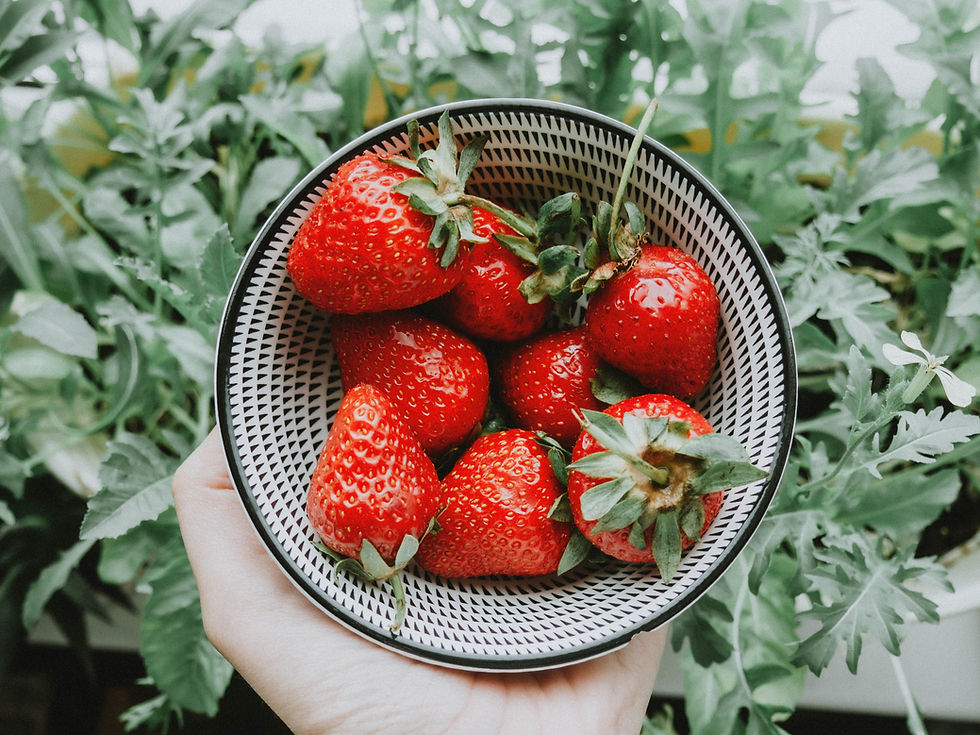Why It’s Important to Choose Organic Produce
- Dr. Michelle Green

- Jul 23, 2024
- 3 min read

In our quest for healthier living, one of the most impactful choices we can make is to opt for organic produce. Organic farming practices prioritize the health of the soil, plants, animals, and people, making it a more sustainable and beneficial option for both our health and the environment. Let's explore the reasons why choosing organic produce is crucial and understand the concepts of the Dirty Dozen and Clean Fifteen.
1. Avoid Harmful Chemicals
Conventional farming often relies on synthetic pesticides, herbicides, and fertilizers to maximize crop yield. These chemicals can leave residues on the produce we consume, which can be harmful to our health. Pesticides have been linked to a range of health issues, including:
Gut Health: Chemicals can disrupt the balance of our gut microbiota, leading to digestive problems and weakened immunity.
Neurological Effects: Certain pesticides are neurotoxic and can impair brain function, potentially leading to cognitive issues.
Hormonal Disruption: Pesticides can act as endocrine disruptors, interfering with hormonal balance and potentially causing reproductive issues.
Increased Cancer Risk: Long-term exposure to certain chemicals has been associated with a higher risk of cancer.
By choosing organic produce, we can significantly reduce our exposure to these harmful substances.
2. Support Sustainable Farming Practices
Organic farming emphasizes the use of natural processes and inputs, such as compost, green manure, and biological pest control. This approach helps to:
Maintain Soil Health: Organic farming enhances soil fertility and structure, promoting a rich and biodiverse ecosystem.
Protect Water Quality: By avoiding synthetic chemicals, organic farming reduces the risk of water contamination from agricultural runoff.
Promote Biodiversity: Organic farms often have higher biodiversity, supporting a variety of plant and animal species.
Supporting organic farmers means it is also better for the health of our planet.
3. Better Nutrition in Organic Produce
Studies suggest that organic produce may contain higher levels of certain nutrients compared to conventionally grown produce. This can include:
Antioxidants: Organic fruits and vegetables often have higher levels of antioxidants, which help protect our cells from damage.
Vitamins and Minerals: Some organic produce may have higher concentrations of essential vitamins and minerals.
Eating organic can contribute to a more nutrient-dense diet.
4. The Dirty Dozen and Clean Fifteen
If you are looking to prioritize what should definitely be organic versus what you might be able to get away with not getting organic, look no further. The Environmental Working Group (EWG) releases an annual list of produce items that are most and least contaminated with pesticide residues. This list can help you make better informed choices about when to prioritize organic options.
The Dirty Dozen: This list includes the top 12 fruits and vegetables that are most likely to contain pesticide residues. It's recommended to buy these items organic whenever possible.
1. Strawberries

2. Spinach
3. Kale, collard, and mustard greens
4. Nectarines
5. Apples
6. Grapes
7. Bell and hot peppers
8. Cherries
9. Peaches
10. Pears
11. Celery
12. Tomatoes
The Clean Fifteen: This list includes produce that is least likely to contain pesticide residues, making them safer choices if organic options are not available.
1. Avocados
2. Sweet corn
3. Pineapples
4. Onions

5. Papayas
6. Sweet peas (frozen)
7. Asparagus
8. Honeydew melon
9. Kiwi
10. Cabbage
11. Mushrooms
12. Cantaloupe
13. Mangoes
14. Watermelon
15. Sweet potatoes
By focusing on organic options for the Dirty Dozen and being less stringent with the Clean Fifteen, consumers can make smarter, healthier choices without breaking the bank.
Conclusion
Choosing organic produce is a powerful step towards better health and a more sustainable world. By reducing our exposure to harmful chemicals, supporting sustainable farming practices, and potentially increasing our nutrient intake, we can contribute to our well-being and that of the planet. When grocery shopping, consider prioritizing organic options for the Dirty Dozen and feel more comfortable with conventionally grown items from the Clean Fifteen list.
References
Environmental Working Group. (2024). Dirty Dozen and Clean Fifteen. Retrieved from EWG Website
Organic Trade Association. (2024). The Benefits of Organic. Retrieved from OTA Website
By making informed choices, we can lead healthier lives and support practices that nurture the Earth for future generations.



Comments